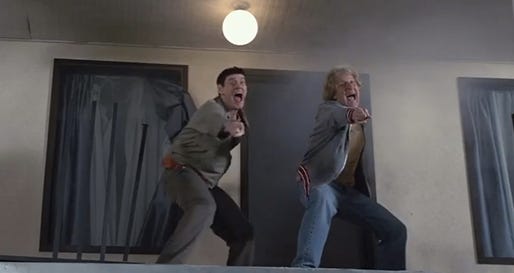Dumb and Dumber To

Nostalgic victory laps like “Dumb and Dumber To,” a 20-years-on sequel, ultimately come down to the pace that returning stars and creative teams are able to maintain. Like any slacked-off runners who scoff at training but enter the race anyway, co-stars Jim Carrey & Jeff Daniels and writer-directors Peter & Bobby Farrelly stumble at the starting pistol and exhaust their energy before the end. But they find their strides somewhere in the straightaways, albeit a few steps slower.
The marble-mouthed lengths to which the otherwise respectable Daniels goes for a low laugh are no longer a surprise, even if his oft-bared butt deserves third billing. The pliability of Carrey’s jawline and vocal cords is no longer a novelty. And the Farrelly Brothers long ago ceded the crown of comic taste-making after serving up heaping platters of bland, pasty dreck in “The Heartbreak Kid” and “Hall Pass.”
They also slather on a few too many callbacks to the original, namely blind Billy in 4C’s endangered aviary of birds and a pair of overlong fantasy sequences. Plus, with six writers and two improvisational leads, it often feels like 16 hands firing a har-har Howitzer to see what sticks. Still, for all its missteps, “Dumb To” provides osmotic, pleasant-chuckle fun with a handful of surprisingly huge belly laughs.
In these moments, it’s a welcome reminder of how great the Farrellys can be, even if this film isn’t their best. In the challenged rules of an absurd fart-smelling game, carefully choreographed wordplay pivots and pirouettes into amiable absurdity. Gags are set up that won’t pay off for an hour. Some of them, as with the film’s biggest first-act laugh, are so cleverly disguised you won’t see them coming. They gleefully sustain the inevitable scene in which Daniels is mistaken for a genius. Plus, they elicit fine voice-of-reason performances — personified here by the usually goofy Rob Riggle as a beleaguered, bulky bad guy who winds up tailing our heroes.
Sound familiar to the last time Harry Dunne (Daniels) and Lloyd Christmas (Carrey) hit the road? Narratively, “Dumb To” is the same thing, indistinguishable from, say, a 1999 sequel save the smartphones and a TED-like conference. The guys get caught up in a more murderous version of “Tommy Boy’s” gold-digging wife plot — perpetrated here by Laurie Holden, whose gun stance feels more like her survivalist “Walking Dead” character than a sniveling socialite.
Harry and Lloyd are also pursuing another woman. This time, it’s Penny (Rachel Melvin), the daughter Harry never knew he had. Born of the fabled Fraida Felcher (Kathleen Turner) and surrendered for adoption, Penny is a genetic match for the kidney donation Harry needs and the latest woman on whom Lloyd foists himself. Melvin’s irrepressibly upbeat, adorably dim Patty is the movie’s ace in the hole, and the actress stands on even footing in moments of wacky comedy and light drama.
Meanwhile, Turner’s Fraida is the butt of endless jokes about stretch marks and sagging flesh from guys who haven’t aged so gracefully themselves. If any grievance gets in the way of the good nature, it’s this uncharacteristic tendency to sometimes go mean and meaner lest it seem square beside cringe-comedy contemporaries.
Harry and Lloyd killed a man before, yes, but he was bad and they unknowingly fed him poison instead of his prescription. They’re idiots, not ingrates. These versions of the characters might not try to stop an overaggressive police officer from inadvertently drinking their piss. Lloyd is especially cruel at times, cracking crass jokes about AIDS and dead kids, and his horndog lechery for Penny lurches into creepy territory. Nothing against cringe comedy or the Farrellys’ aptitude for it in other movies. It simply doesn’t fit Harry and Lloyd. We don’t want to see these two get comeuppance; we want to see them giggle at a sexual misreading of the word.
Thankfully, the Farrellys’ sweet streak (the oft-derided saving grace of the underrated “Stuck on You” and “Fever Pitch”) wins out. The finale subverts one thread of sentimentality while latching onto another, more surprising one, and the closing moments channel the (mostly) harmless, gentle idiocy with which Harry and Lloyd have stumbled through life.
Although it’s hardly a personal record for anyone involved, “Dumb and Dumber To” shows that sporadic and unsteady can still finish the race, too.


